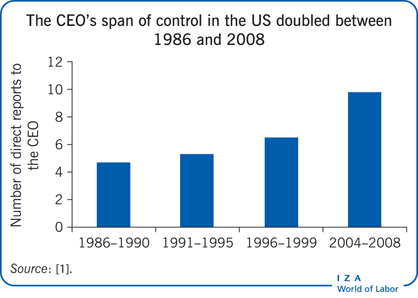Elevator pitch
Managers are supervising more and more workers, and firms are getting flatter. However, not all firms have been keen on increasing the number of subordinates that their bosses manage (referred to as the “span of control” in human resource management), contending that there are limits to leveraging managerial ability. The diversity of firms’ organizational structure suggests that no universal rule can be applied. Identifying the factors behind the choice of firms’ internal organization is crucial and will help firms properly design their hierarchy and efficiently allocate scarce managerial resources within the organization.
Key findings
Pros
Larger spans of control facilitate the leveraging of managerial talent to more workers.
More knowledgeable workers can work more autonomously and therefore need less managerial time, allowing managers to supervise more workers.
Performance evaluation facilitates learning about workers’ ability and makes the allocation of talent within the firm more efficient.
Product market competition leads to flatter organizations and makes firms more responsive to their changing environment.
New technologies improve communication and information acquisition and allow managers to supervise more workers.
Cons
Higher spans of control limit the attention that managers can allocate to each worker, diluting the transmission of talent.
The reduction in the number of layers limits promotion opportunities and can lead to an increase in wage inequality within the firm.
The highest performers do not necessarily make the best managers, as leadership skills may differ from task-specific skills.
Loss of control associated with reducing the number of layers might affect the quality of decision-making.
Learning takes time, and lack of knowledge about individual managerial ability can lead to short-term misallocation of talent.
